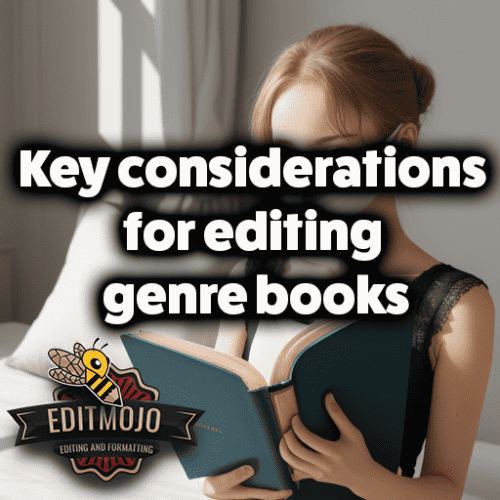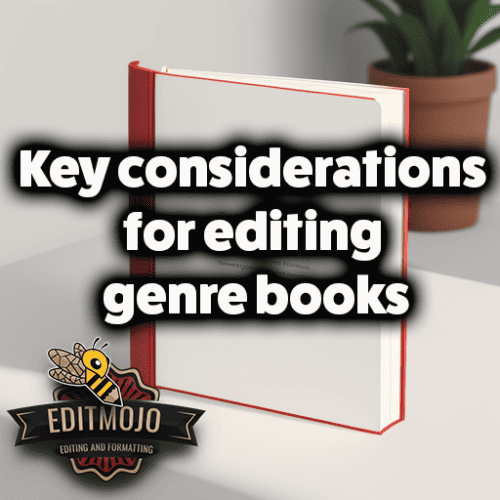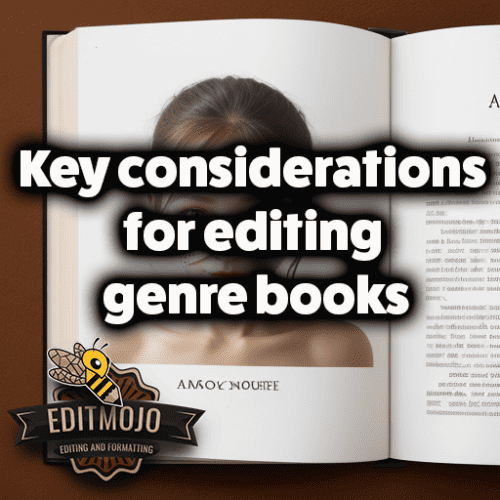Key considerations for editing genre books
Key considerations for editing genre books. When we dive into a fantasy novel, our hearts race as dragons swoop overhead. In a crime thriller, we become super sleuths, using our intellect to crack the most complex of cases. It’s the genre’s signature that immerses us in the book’s world, making the reading experience unique. The art of genre-specific editing is vital in shaping these immersive experiences, an unsung hero that refines raw narrative into a gripping novel. This article will navigate through key considerations an editor must bear in mind while refining genre-specific books.
Key Takeaways
| Key Points | Detailed Explanation |
|---|---|
| Understanding the Role of an Editor | An editor refines the raw manuscript into a captivating novel. They ensure coherence and consistency while aligning the book with genre norms. |
| Defining Different Genres | Each genre has unique conventions and expectations. Understanding these is crucial for effective editing. |
| Genre-Specific Editing Considerations | Editors must understand and juggle genre-specific requirements like pacing, world-building, scientific accuracy, etc. |
| Avoiding Genre Pitfalls | Avoiding clichés and keeping the narrative fresh is vital. Editors must strike a balance between genre expectations and originality. |
| Editor’s Tools | Tools like Grammarly, ProWritingAid, Scrivener, and World Anvil can assist in editing and managing large and complex works. |
| Working with Authors | The editor-author relationship is a delicate one that should be based on trust and mutual respect. Constructive feedback and respect for the author’s voice are crucial. |
| Industry Insights | With the rise of self-publishing and digital platforms, genre books have gained significant popularity, posing both opportunities and challenges for editors. |
Understanding the Role of an Editor in Genre Books
The Many Hats of an Editor
An editor is the backstage maestro, orchestrating an author’s raw manuscript into a symphony that strikes a chord with readers. They ensure the plot is coherent, the characters’ development aligns with the storyline, and the book’s tone is consistent. In genre-specific books, the editor’s role is augmented – they are gatekeepers ensuring that the book aligns with the norms and expectations of the genre.

Case Study: The Role of an Editor in J.K. Rowling’s Success
Take J.K. Rowling’s Harry Potter series, for instance. Barry Cunningham, Rowling’s first editor, saw the potential in a story about a boy wizard when many others had dismissed it. His understanding of the fantasy genre played a crucial role in shaping the ‘Potterverse.’ He identified the tropes that would work, advised on world-building elements, and helped Rowling deliver a story that continues to enthrall readers of all ages.
Defining Different Genres and Their Unique Characteristics
Each genre carries its rhythm, its quirks, and its norms. As an editor, having a deep understanding of these genre characteristics is like possessing the secret recipe for a book that readers can’t put down.
Fantasy, Sci-Fi, Mystery, Romance, and More
Fantasy demands intricate world-building, sci-fi calls for scientific accuracy, mystery hinges on suspense, and romance thrives on emotional depth. Each of these genres has conventions that readers expect, and straying too far from them can make the book less engaging to its target audience.
Successful Books in Each Genre and Their Editing Process
Consider George R.R. Martin’s ‘A Song of Ice and Fire.’ The series’ success lies in its complex, intricately woven plot and the vast, immersive world Martin creates. But as his editor reveals, it was a careful editing process that helped shape the final product, ensuring that Martin’s expansive world didn’t overwhelm the core plot.
Genre-Specific Editing Considerations

Pacing, World-Building, Scientific Accuracy, and More
The heartbeat of a thriller is its fast pace. Slow it down, and you lose the reader’s grip. The magic of a fantasy is in its world-building – undermine it, and the illusion shatters. Each genre comes with its own set of rules that an editor needs to juggle, and understanding these nuances can spell the difference between a blockbuster and a flop.
Balancing Consistency and Innovation
As editors, the challenge lies in balancing adherence to genre norms while leaving room for innovation. Take the trend of genre-bending books like Marlon James’ Black Leopard, Red Wolf, which blends fantasy with African folklore. Here, the editor’s role is to ensure that the book still resonates with fantasy readers while introducing new, unique elements.
Avoiding Genre Pitfalls
Steering Clear of Clichés
Clichés are the quicksand of genre books. While some genre conventions might border on clichés, the challenge lies in creatively reworking them. The handsome prince doesn’t always have to rescue the damsel in distress in a romance novel, just as the hardened detective doesn’t always have to be battling personal demons in a crime thriller.
Keeping the Narrative Fresh
An essential consideration for genre-specific editors is how to help authors break new ground. It is all about the fine balance between respecting genre expectations and pushing creative boundaries to avoid genre fatigue.

Editor’s Tools for Genre Books
The editor’s arsenal contains more than just a red pen. Tools like Grammarly and ProWritingAid can aid mechanical edits, while software like Scrivener can help manage more extensive works with complicated plotlines. For fantasy editors, World Anvil can be invaluable in tracking world-building elements.
Working with Authors
Navigating the Editor-Author Relationship
Editing is a collaborative process. The relationship between an editor and an author needs to be one of trust and mutual respect. Editors must provide constructive criticism that motivates authors to improve, all while respecting their creative vision.
Case Study: The Relationship Between Raymond Carver and Gordon Lish
Renowned short story author Raymond Carver and his editor, Gordon Lish, provide an interesting case study. Lish’s extensive edits, sometimes cutting down half of Carver’s stories, initially caused friction. However, Carver eventually admitted that Lish’s edits helped him find his unique, minimalist voice, as described in this New Yorker article.
Industry Insights: The Role of Genre Books in the Publishing Landscape
The genre book market is ever-evolving. With the rise of self-publishing and digital platforms, genre books have exploded in popularity. For editors specializing in genre books, this represents both a significant opportunity and a unique challenge in maintaining high standards amidst rapidly increasing volume.
Conclusion (Key considerations for editing genre books)
Editing genre books is a rewarding journey, one that allows you to shape narratives that transport readers into captivating new worlds. It demands an understanding of the unique rhythm each genre dances to and the creativity to choreograph innovative steps without missing a beat. Whether you’re a new editor stepping into the world of genre-specific editing or an experienced one looking to polish your skills, every page you edit brings you one step closer to creating the next bestseller.
Further Resources (Key considerations for editing genre books)
To explore more about genre-specific editing, check out resources like The Artful Edit by Susan Bell or enroll in courses such as the Editing Certificate from the University of Chicago Graham School. Online communities like Absolute Write and Scribophile are excellent platforms to learn from peers and share experiences. The art of editing is a continuous learning journey, and every story you help shape enriches your mastery.
Top Five Questions and Answers
| Questions | Answers |
|---|---|
| Why is genre-specific editing important? | Genre-specific editing is crucial as each genre has unique norms and expectations. An effective editor ensures the book aligns with these conventions, creating an engaging experience for the readers. |
| How does understanding different genres help in editing? | Each genre has unique conventions like pacing, world-building, character development, etc. Understanding these allows an editor to effectively refine a book to resonate with its target audience. |
| What are common genre pitfalls to avoid? | Common pitfalls include relying on clichés and not maintaining freshness in the narrative. Balancing between genre expectations and originality can help avoid these pitfalls. |
| How can editors maintain a good relationship with authors? | The editor-author relationship should be based on trust and mutual respect. Providing constructive feedback while respecting the author’s creative vision is crucial. |
| How has the rise of self-publishing and digital platforms affected genre book editing? | The rise of these platforms has led to an explosion in genre books. While this presents opportunities for genre-specific editors, it also poses challenges in maintaining quality amidst a rapidly increasing volume. |
